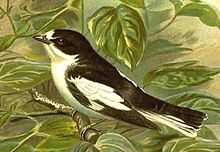Semicollared flycatcher
| Semi-collared flycatcher | |
|---|---|
 | |
| Conservation status | |
| Scientific classification | |
| Kingdom: | Animalia |
| Phylum: | Chordata |
| Class: | Aves |
| Order: | Passeriformes |
| Family: | Muscicapidae |
| Genus: | Ficedula |
| Species: | F. semitorquata |
| Binomial name | |
| Ficedula semitorquata (Homeyer, 1885) | |
The semi-collared flycatcher (Ficedula semitorquata) is a small passerine bird in the Old World flycatcher family, one of the four species of Western Palearctic black-and-white flycatchers. It breeds in the southeastern corner of Europe, the Middle East and southwestern Asia. It is migratory, wintering in Africa. It is a rare vagrant in western Europe.
This is a 12-13.5 cm long bird, intermediate in appearance between collared flycatcher and European pied flycatcher. It has often been classed as a subspecies of collared flycatcher.
The breeding male is mainly black above and white below, with a white half-collar, extending further back than in pied, large white wing patch, extensively white tail sides and a large white forehead patch. It has a pale grey rump. The bill is black and has the broad but pointed shape typical of aerial insectivores. It mainly takes insects in flight, rarely hunting caterpillars amongst the tree foliage like pied flycatcher.
Non-breeding male, females and juvenile semi-collared flycatchers have the black replaced by a pale brown, and may be very difficult to distinguish from other Ficedula flycatchers, particularly the collared flycatcher. A distinction is that semi-collared may show a white second wing bar, but many individuals are not separable in the field.
Semi-collared flycatchers are birds of belts of deciduous woodlands, especially oak and hornbeam, in mountainous areas. They build an open nest in a tree hole, and 4-7 eggs are laid. The song is again intermediate between collared and pied flycatchers, with slow strained whistles, but some rhythmic elements.
References
- ↑ BirdLife International (2012). "Ficedula semitorquata". IUCN Red List of Threatened Species. Version 2013.2. International Union for Conservation of Nature. Retrieved 26 November 2013.
| Wikimedia Commons has media related to Semicollared flycatcher. |
